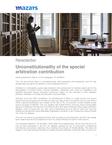
Unconstitutionality of the special arbitration contribution
This rule has serious flaws of unconstitutionality, both procedural and substantive, and this has already been brought to the attention of the Constitutional Court.
Arbitration is undoubtedly a great step forward for the achievement of material justice and for the decongestion of judicial offices. Through arbitration, individuals have found an expeditious and qualified alternative dispute resolution mechanism (Masc) for the resolution of their disputes. However, arbitration is a costly and, therefore, exclusive Masc.
Although, since the 1991 Constitution, the development of Masc is a state priority, the current Government and Congress do not seem to share such idea, since in the last tax reform (Law 1819 of 2016) a special contribution was created, at the rate of 2%, for economic content awards whose amount exceeds 73 SMLMV. This rule, together with Article 61(2)(c) of the tax reform that prohibits taking as a deduction the payment of sentences other than labor sentences, discourages arbitration litigation, since for those who win, their right is impaired by the levy and for those who lose, the sentence to be paid will not be deductible (regardless of whether or not it meets the criteria of Article 107 of the Tax Statute).
This rule has serious unconstitutional flaws, both procedural and substantive, and this has already been made known to the Constitutional Court in a lawsuit filed by the author of this column.
The procedural defects in its formation, which affect its constitutionality, are the fact that this norm has not been discussed in the four (4) debates required by law (in permanent constitutional commissions and plenary sessions), thus violating the principle of flexible identity, This does not happen in this case because the idea of creating a special arbitration contribution did not arise from the beginning (and therefore no reference is made to it in the explanatory memorandum), but only at the end of the legislative process. Likewise, the article in question violates the principle of unity of subject matter because although it is the regulation of a tax (special contribution), the Constitutional Court, in judgment C-537/2011 indicated that matters that are autonomous and separable cannot be included in the processing of a bill, as is clearly the case with this matter.
Regarding the substantive defects that affect its constitutionality, the constitutional rights to free access to the administration of justice (art. 229 of the National Constitution), to equality (art. 13 of the National Constitution), to contribute to the financing of the judicial system (art. 13 of the Constitution), to the right of the State to contribute to the financing of the judicial system (art. 229 of the National Constitution), and to the right of the State to contribute to the financing of the judicial system (art. 13 of the Constitution) are violated. ), to contribute to the financing of the burdens of the State under the principles of justice and equity (art. 95 n 9 of the C.N.) and to have a tax system governed by the constitutional principles of progressiveness, tax justice and equity (art. 363 of the C.N.).
By establishing the rule that the "taxable base of the special contribution shall be the total value of the payments ordered in the corresponding award, ruling or condemnatory sentence", the following effects are generated, which seriously damage the principle of tax progressivity:
As the attacked contribution falls on the "emerging damage" component established in the arbitration award, the Masc user is being taxed on an item that -far from enriching him-, has the purpose of restoring his patrimony.
By levying the tax on the component "costs" and "agencies at law", a reimbursement of expenses would be taxed, since it is equivalent to what the party had to invest to enforce its rights (both in procedural expenses and attorney's fees).
When the contribution falls on the item procedural sanctions, such as sanctions for excess of estimation of claims with respect to the estimatory oath, sanctions for non-attendance to procedural hearings, among others, the obligation to contribute to the expenses and costs of the State under the concepts of justice and equity would be violated, since the taxpayer would be taxed twice for an item that is already paid in favor of the State.
By levying the contribution on the item "loss of profits", the principles of equity and tax justice would be violated, since such item would already be taxed with the income tax, reason for which it is inequitable to tax it with another tax.


